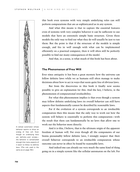this book even systems with very simple underlying rules can still perform computations that are as sophisticated as in any system.
And what this means is that to capture the essential features even of systems with very complex behavior it can be sufficient to use models that have an extremely simple basic structure. Given these models the only way to find out what they do will usually be just to run them. But the point is that if the structure of the models is simple enough, and fits in well enough with what can be implemented efficiently on a practical computer, then it will often still be perfectly possible to find out many consequences of the model.
And that, in a sense, is what much of this book has been about.
The Phenomenon of Free Will
Ever since antiquity it has been a great mystery how the universe can follow definite laws while we as humans still often manage to make decisions about how to act in ways that seem quite free of obvious laws.
But from the discoveries in this book it finally now seems possible to give an explanation for this. And the key, I believe, is the phenomenon of computational irreducibility.
For what this phenomenon implies is that even though a system may follow definite underlying laws its overall behavior can still have aspects that fundamentally cannot be described by reasonable laws.
For if the evolution of a system corresponds to an irreducible computation then this means that the only way to work out how the system will behave is essentially to perform this computation—with the result that there can fundamentally be no laws that allow one to work out the behavior more directly.
And it is this, I believe, that is the ultimate origin of the apparent freedom of human will. For even though all the components of our brains presumably follow definite laws, I strongly suspect that their overall behavior corresponds to an irreducible computation whose outcome can never in effect be found by reasonable laws.
And indeed one can already see very much the same kind of thing going on in a simple system like the cellular automaton below. For
A cellular automaton whose behavior seems to show an analog of free will. Even though its underlying laws are definite—and simple—the behavior is complicated enough that many aspects of it seem to follow no definite laws. (The rule used is the same as on page 740.)




